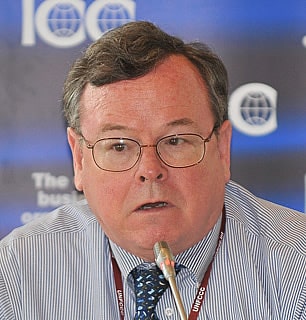In September 1996, Exxon Research and Engineering Company’s Brian Flannery delivered a presentation to Exxon subsidiary Esso Italiana titled “Global Climate Change.” A part of a larger collection released by Jelmer Mommers of De Correspondent in a trove of internal oil and gas industry documents, this document shows Flannery’s denial of climate change science, doubt of humanity’s ability to predict future climate change, support for the continued use of fossil fuels, and encouragement of regulatory inaction.
Dismissing “jargon” surrounding the climate debate, Flannery sets out to disprove the perceived “proven [and] unacceptable risk” of climate change. Emphasizing his role in developing climate models used by the Intergovernmental Panel on Climate Change (IPCC), he cites his work as central to projecting future changes in global temperature and sea level. He also states that his scientific work on CO2 stabilization and climate change detection were published with the most recent IPCC assessment. Despite his close involvement with the IPCC and his research on climate, Flannery argues against taking action on climate change throughout the entirety of his presentation.
At odds with internal Exxon studies, Flannery claims that there is no certainty on the existence of climate change. Flannery says “observations do not confirm that human activities have led to any global warming.” Instead of placing blame on human activities for the changing climate, Flannery points his finger at natural events such as the Pinatubo eruption and El Niño.
Since he believes that human activity is unrelated to climate change, Flannery concludes that we should continue to utilize fossil fuels freely and that we do not need to curb or stabilize CO2 emissions. He argues that stabilizing CO2 concentrations would be costly and would lower the GDP of the United States if enacted, estimating that we would lose 3% of our GDP per year. Additionally, Flannery states that cheap coal is essential for developing countries to thrive. “As for the longer term,” Flannery concludes, “at this point it is too soon to be taking hard and fast decisions about the climate change … flexibility should be the hallmark.”


